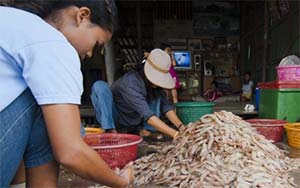As of January 1, all seafood suppliers participating in the Global Aquaculture Alliance’s (GAA) Best Aquaculture Practices (BAP) third-party certification program will no longer be permitted to outsource the processing of shrimp to third-party entities.
The decision to prohibit the practice, which has been commonplace in Southeast Asia, follows Associated Press reports of child labor abuse and forced labor in the shrimp supply chain, specifically at peeling and heading “sheds.” A shed refers to a seasonal, temporary processing plant that operates independently and may be unregistered and unlicensed. Licensed facilities that are part of a larger processing plant are not included in the prohibition.
 “Our experience over many years with farmed shrimp is that most of the peeling and heading of shrimp is conducted at well run processing facilities, and it is only during infrequent periods of peak supply from farms that outsourcing takes place,” said GAA Executive Director Wally Stevens. “The current BAP processing plant standards require facilities that outsource their peeling or heading operations to maintain appropriate controls over the environmental, social and food-safety practices of those outsourced operations. But obviously it would be far better if these processing steps were conducted in-house. Accordingly, we will prohibit BAP-certified facilities from outsourcing their peeling and heading operations, effective January 1, 2016.”
“Our experience over many years with farmed shrimp is that most of the peeling and heading of shrimp is conducted at well run processing facilities, and it is only during infrequent periods of peak supply from farms that outsourcing takes place,” said GAA Executive Director Wally Stevens. “The current BAP processing plant standards require facilities that outsource their peeling or heading operations to maintain appropriate controls over the environmental, social and food-safety practices of those outsourced operations. But obviously it would be far better if these processing steps were conducted in-house. Accordingly, we will prohibit BAP-certified facilities from outsourcing their peeling and heading operations, effective January 1, 2016.”
 Shrimp peeling in unlicensed facilities contracted by further processors will no longer be permitted under the Global Aquaculture Alliance’s Best Aquaculture Practices third-party certification program starting January 1. (Photo: ethicaltrade.org)BAP is the world’s only third-party aquaculture certification program with seafood processing plant standards. Its standards are comprehensive, encompassing the entire aquaculture value chain, from hatcheries and feed mills to farms and processing plants.
Shrimp peeling in unlicensed facilities contracted by further processors will no longer be permitted under the Global Aquaculture Alliance’s Best Aquaculture Practices third-party certification program starting January 1. (Photo: ethicaltrade.org)BAP is the world’s only third-party aquaculture certification program with seafood processing plant standards. Its standards are comprehensive, encompassing the entire aquaculture value chain, from hatcheries and feed mills to farms and processing plants.
GAA takes very seriously allegations of child labor and forced labor in the seafood supply chain, assured Stevens. Allegations of non-compliance can trigger an unannounced audit, in addition to routine annual audits. Since its inception in 1997, GAA has proactively addressed issues such as social justice by working with stakeholders to find practical solutions that can be implemented effectively and continuously improved over time.
The Association Press story, carried by newspapers around the world and posted at websites with global readership, stated that journalists followed trucks loaded with shrimp at Gig Peeling Factory sheds in Thailand over a five-day period. They reportedly made deliveries to major further processors and exporters, among them: N&N Foods, owned by Tokyo-headquartered Maruha Nichiro Foods; Okeanos Food, a subsidiary of Thai Union; Kongphop Frozen Foods; and Siam Union Frozen Foods. Finished products from these companies are exported to major retail and foodservice chains worldwide.
Thai Union to Stop External Pre-Processing
Thai Union, which says it has no knowledge of forced labor at the supplier, already announced last week that beginning January 1 all of its shrimp processing operations will be conducted within the confines of company-operated plants. As such, shellfish peeling and other services formerly performed by outside vendors will no longer be contracted, and many workers who had performed such jobs will be given the opportunity to remain employed by joining Thai Union.
“The move will provide us with full oversight of all processing stages. All processing work will be directly controlled by Thai Union, ensuring that all workers, whether migrant or Thai, are in safe, legal employment and are treated fairly and with dignity,” declared the company in a prepared statement issued on December 10.
The Bangkok-headquartered frozen and canned seafood company, which employs 46,000 people worldwide, is investing approximately $5 million to bring all phases of processing under its roof to guarantee total adherence to a revised Business Ethics and Labor Code of Conduct that was drawn up in September.
“We were concerned that, despite regular audits, it is difficult to guarantee that all external pre-processors were adhering to our Code of Conduct,” said Thiraphong Chansiri, the company’s president and chief executive officer. “I am pleased that we are implementing our plans to bring pre-processing of our shrimp products into Thai Union and are able to offer safe and legal employment to thousands more workers. This is a positive step towards our goal of ridding the Thai seafood sector of illegal labor practices. We are committed to leading improvements in the industry and we hope this reminds all operators that they must remain focused on promoting good labor practices – the abuse of human rights must not be tolerated.”
Dr. Panisuan Jamnarnwej, honorary chairman of the Thai Frozen Foods Association (TFFA), praised Thai Union’s action as part of the solution to elevate the national industry and drive positive change in the management of the category.
“By bringing pre-processing operations in house, Thai Union will be able to monitor and promote the welfare of their workers directly,” he said.
Meanwhile, the Thai government has vowed to continue cracking down on labor abuses. Prime Minister Prayuth Chan-o-cha, in a story published in the December 14 issue of the Bangkok Post, commented: “We are dealing with the issue, aren’t we? Arrests are underway.”





